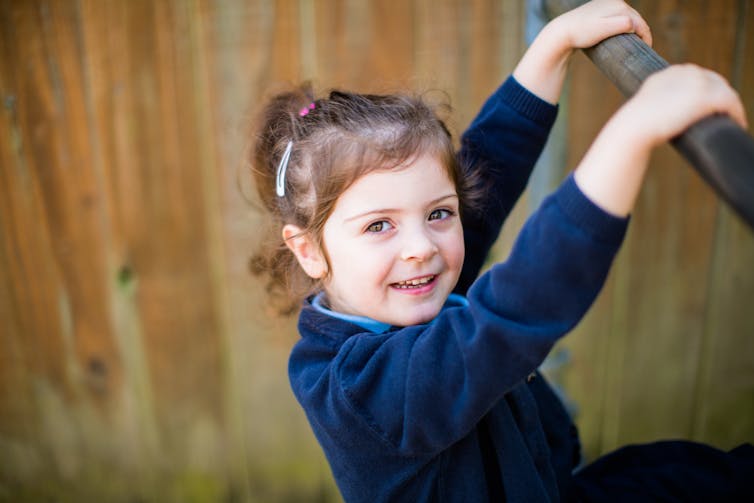How can I tell if my child is ready to start school next year?
- Written by Kate Highfield, Senior Lecturer, Deputy Head of School (ACT and regional NSW), Australian Catholic University

At this time of year many parents and carers are asking a familiar set of questions.
Should I send my child to school next year? Are they ready? Would it be better to hold them back?
These are complex questions. Here are some factors for parents to consider.
You need to be at school by the age 6
In Australia, primary and secondary school are compulsory[1] between the ages of 6 and 16, however there are varying cut-off dates between states and territories[2].
For example, children in NSW can start school the year they turn five if their birthday is before July 31, and must be enrolled before they turn six.
In the Australian Capital Territory and Victoria the cut-off date is April 30, in South Australia it is May 1, in Queensland and the Northern Territory it is June 30.
This means a class in the first year of school can have a big difference in ages. Some will start school while they are still four, others could be six.
So depending on when your child’s birthday is, you may have a choice to send them this year or next.
Read more: A push to raise the school starting age to 6 sounds like good news for parents, but there's a catch[3]
The cost-of-living question
Although the school start decision is ultimately placed at the feet of parents, government policies and support are essential considerations for families.
Some parents cannot wait to send their children to school because it means they will no longer need to pay childcare fees.
As the cost of living[4] continues to be a concern for many Australian families, parents will no doubt be comparing the ongoing cost of childcare with the lack of fees in the public school system.
However for some, the July 2023 boost to the childcare subsidy[5] may mean school is no longer a radically cheaper option.
Is it better to ‘hold them back?’
Research[6] shows wealthier families are more likely to delay starting school, to give their children more time to develop physically, academically and emotionally.
Certainly there is no shortage of news reports[7] featuring parents who decide to “hold them back” in the belief it is beneficial. There is some evidence this is more often the case for boys[8].
But research only shows a slight benefit in academic and socio-behavioural outcomes in the early years of school. Australian research suggests[9] delayed school entry does not have a lasting influence on basic reading and maths skills in middle primary school and the early years of high school.
Nevertheless, the option to delay starting school is particularly important for children who may need more time to develop. This includes children from culturally and linguistically diverse backgrounds[10] as well as children who have specific inclusion needs[11]. Parents of these children also need more support as they prepare their children for school.
Read more: Should you hold your child back from starting school? Research shows it has little effect on their maths and reading skills[12]
The focus of school has changed
The education system and the way childhood is viewed by schools has also changed in recent decades. Instead of seeing children as “blank slates” to be filled with knowledge, contemporary ideas[13] see children as active learners, with rights to play and agency or choice.
Learning today[14] is about ways of thinking, ways of working and ways of living.
This means specific subject knowledge – such as children knowing letters and sounds – is now considered just one of the skills children learn.
Think about these questions
Unsurprisingly, our ideas about “school readiness” have also changed. When educators think about whether a child is ready to start school they consider these sorts of issues:
executive function: can your child stay focused and retain bits of information?
self-regulation: can they manage their emotions?
asking for help: can they ask for help if they need it to understand an instruction or deal with a problem in the playground?
wellbeing: does your child have good self-esteem and how do they manage if things aren’t going well?
These aspects of children’s development have been found to be closely linked with success[15] in educational contexts.
Transitions matter more than the age
It can seem like there is huge pressure on parents to “get it right” over school starting age. But it is worth remembering starting school is just one of the transitions[16] children will make in their lives.
Also remember you are not alone. Many people are also grappling with these questions.
If you are unsure of your child’s development in these areas – talk to your “educational village”. These are your child’s early childhood educators, maternal and child health team and the school you are considering. They are here to help.
References
- ^ compulsory (www.servicesaustralia.gov.au)
- ^ states and territories (www.servicesaustralia.gov.au)
- ^ A push to raise the school starting age to 6 sounds like good news for parents, but there's a catch (theconversation.com)
- ^ cost of living (theconversation.com)
- ^ childcare subsidy (www.servicesaustralia.gov.au)
- ^ Research (www.igi-global.com)
- ^ news reports (www.smh.com.au)
- ^ for boys (www.sciencedirect.com)
- ^ research suggests (theconversation.com)
- ^ culturally and linguistically diverse backgrounds (www.tandfonline.com)
- ^ inclusion needs (raisingchildren.net.au)
- ^ Should you hold your child back from starting school? Research shows it has little effect on their maths and reading skills (theconversation.com)
- ^ contemporary ideas (www.australiancurriculum.edu.au)
- ^ Learning today (www.education.gov.au)
- ^ closely linked with success (www.frontiersin.org)
- ^ transitions (theconversation.com)
Read more https://theconversation.com/how-can-i-tell-if-my-child-is-ready-to-start-school-next-year-211997

















